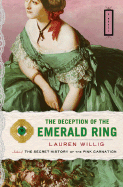
 The third book in Lauren Willig's captivating series, following The Secret History of the Pink Carnation and The Masque of the Black Tulip, is just as beguiling as the first two. Opening in present-day London with Eloise Kelly pursuing her research on a trio of colorful spies (the Scarlet Pimpernel, the Purple Gentian and the Pink Carnation), and her romance, or romance-to-be, with Colin Selwick, the action quickly moves to 1803 England, where Letty Alsworthy has a problem. There had been Alsworthys in Hertfordshire when "the first bemused Norman had galloped through, demanding to know the way to the nearest vineyard," but they weren't a great family, and Letty's sister Mary was having trouble making a good marriage without wealth or title. When she decides to elope with the dashing Lord Geoffrey Pinchingdale-Snipe, Letty steps in to stop this rash act and winds up being forced to marry the lord herself, of course much to their mutual dismay. With a name like Pinchingdale-Snipe, one wouldn't imagine Lord Geoffrey to be dashing, but he definitely is, and also a spy for the League of the Purple Gentian, an arm of the British government. Letty is drawn into intrigue as a result of the marriage and with her undercover agent-husband and his colleagues, is quickly up to her bodice in Bonaparte's spies, Irish rebels and the British secret service.
The third book in Lauren Willig's captivating series, following The Secret History of the Pink Carnation and The Masque of the Black Tulip, is just as beguiling as the first two. Opening in present-day London with Eloise Kelly pursuing her research on a trio of colorful spies (the Scarlet Pimpernel, the Purple Gentian and the Pink Carnation), and her romance, or romance-to-be, with Colin Selwick, the action quickly moves to 1803 England, where Letty Alsworthy has a problem. There had been Alsworthys in Hertfordshire when "the first bemused Norman had galloped through, demanding to know the way to the nearest vineyard," but they weren't a great family, and Letty's sister Mary was having trouble making a good marriage without wealth or title. When she decides to elope with the dashing Lord Geoffrey Pinchingdale-Snipe, Letty steps in to stop this rash act and winds up being forced to marry the lord herself, of course much to their mutual dismay. With a name like Pinchingdale-Snipe, one wouldn't imagine Lord Geoffrey to be dashing, but he definitely is, and also a spy for the League of the Purple Gentian, an arm of the British government. Letty is drawn into intrigue as a result of the marriage and with her undercover agent-husband and his colleagues, is quickly up to her bodice in Bonaparte's spies, Irish rebels and the British secret service.Theatre evenings with secret notes, baskets of oranges with messages stuck beneath their skins, clandestine meetings in alleys and mistaken identities combine to make a good mystery, but the best thing about Willig's novel is her wit. Letty is smart and amusing, if a tad outspoken: "As for Letty . . . he didn't like to think what she might do with an armful of explosives. She was dangerous enough armed with adjectives." The debonair lord, in turn, almost gives as good as he gets, but his new wife causes him some trying moments: "Lord Pinchingdale's eyebrow had climbed so high that Letty was afraid he might do himself permanent damage." And when you least expect it, Willig slips in sly jokes, like "I'm Dooney and this is Burke. We're here to work on the fuses." After infiltrating a group of Jacobins in 1799, Geoffrey wondered why rebel movements seemed to demand expression in song; he had "that interminable 'Ca ira' song stuck in his head, popping up at odd moments, and when he caught himself humming 'Quand l'aristocrate protestera, le bon citoyen au nez lui rira,' he made himself stop--Wrong country, wrong mission, and it didn't even scan."
Letty and Geoffrey's escapades are diverting (more so than Eloise and Colin's), the mystery is well-crafted and the laughs are plentiful. With derring-do, romance, and clever humor, Lauren Willig has created a fine entertainment.--Marilyn Dahl

